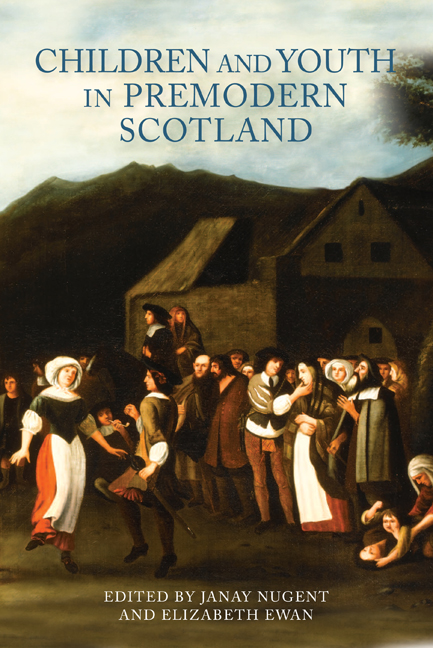Book contents
- Frontmatter
- Dedication
- Contents
- List of Illustrations
- Notes on Contributors
- Acknowledgments
- Abbreviations and Conventions
- Introduction: Adding Age and Generation as a Category of Historical Analysis
- Part I Experiences of Childhood and Youth
- Part II Representations of the Young
- Part III Constructing the Next Generation
- Envoi In Their Own Words: A Mother to Her Son
- Guide to Further Reading
- Index
- St Andrew Studies in Scottish History
5 - Clann and Clan: Children of the Gaelic Nobility, c.1500–c.1800
Published online by Cambridge University Press: 11 May 2021
- Frontmatter
- Dedication
- Contents
- List of Illustrations
- Notes on Contributors
- Acknowledgments
- Abbreviations and Conventions
- Introduction: Adding Age and Generation as a Category of Historical Analysis
- Part I Experiences of Childhood and Youth
- Part II Representations of the Young
- Part III Constructing the Next Generation
- Envoi In Their Own Words: A Mother to Her Son
- Guide to Further Reading
- Index
- St Andrew Studies in Scottish History
Summary
Childhood in Gaelic medieval and early modern Scotland was probably not substantially different to the rest of the country, in that access to education was very much dependent on both social class and gender. Those records that survive, even those from the oral tradition, tend to focus on the higher strata of society, and there is little, if any, evidence of the lot of a low-born child. However, sources such as the Register of the Privy Council of Scotland, and writers such as Samuel Johnson, give a glimpse of some specific areas where an aristocratic childhood north of the Highland line was significantly different from that of the Lowlands, even as late as the second half of the eighteenth century. The bonds of kinship, clan solidarity and cohesion, and continuity of the chiefly lineage are given prominence: the clan was the foundation on which Highland society was built, and the clann, or children, ensured its future prospects.
Muime to Dalta: Foster-Mothers to Foster-Children
One feature of Gaelic society that sets it apart is the tradition of fosterage. While this was mainly used as a means of cementing clan alliances or of ensuring loyalty within the clan, with the chief or clan noble entrusting the care and upkeep of his child to another, there is some evidence in Gaelic literature that the ties of fosterage sometimes superseded the ties of blood for those involved. Fosterage was no ad hoc, casual arrangement: ‘[It] was a socio-political arrangement often used by chiefs to ensure continuation of close relations with the head of a cadet branch, a neighbouring clan or one of his own fine.’ Contracts were drawn up which stated the rights and responsibilities of both parties in some detail. On 29 April 1510, the following contract was agreed:
Obligation by Johne McNeill Vreik in Stronferna, and Gregoure his brother, to receive Coleyne Campbell, lawful third son to Coleyne Campbell, the oldest son and heir of Sir Duncan Campbell of Glenurquhay, knight, in fostering, and to give him a bairn's part of gear; and giving the said Sir Duncan and his heirs their bonds of Manrent [bond of loyalty and protection] and Calps [payment of cattle], that is, the best aucht in their houses in the times of their decease;
- Type
- Chapter
- Information
- Children and Youth in Premodern Scotland , pp. 89 - 103Publisher: Boydell & BrewerPrint publication year: 2015
- 1
- Cited by



